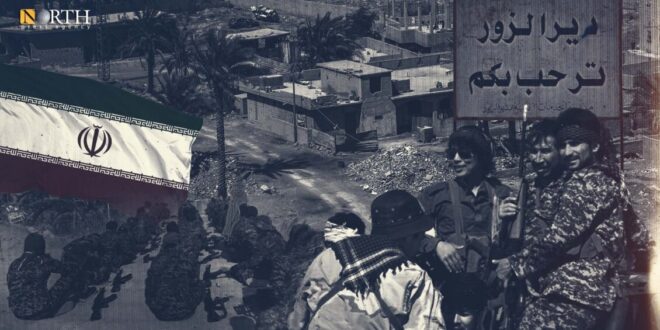A member of Iran-affiliated factions in Deir-ez-Zor who requested anonymity for fear of arrest or prosecution reported to North Press that two months ago, his salary was abruptly cut off.
Dozens of local members who joined the Iranian Revolutionary Guards (IRGC) and its affiliated factions in Deir-ez-Zor and its countryside have come under suspicion and been accused by the leaders of these factions since the start of the war in Gaza.
In recent months, positions held by the IRGC and their affiliated factions across Syria, particularly in the Deir-ez-Zor countryside, have been targeted in Israeli raids.
Members of the IRGC factions from Deir-ez-Zor told North Press that following the onset of the Israel-Hamas war and the subsequent missile exchanges between Iran and Israel, local recruits are no longer trusted.
On Oct. 25, the Israeli Defense Forces (IDF) announced a strike on Iranian targets “in response to the Iranian regime’s continued attacks on Israel in recent months.”
Prior to this, Iran launched more than 200 ballistic missiles at various Israeli targets, claiming the operation was in retaliation for the killings of “Ismail Haniyeh and Hassan Nasrallah.”
Loss of Confidence
Hussein al-Hamad, a pseudonym for a member of Iran-affiliated factions in Deir-ez-Zor who requested anonymity for fear of arrest or prosecution, reported that two months ago, his salary was abruptly cut off.
Hamad and hundreds of other members from rural Deir-ez-Zor depend on their monthly wages from these pro-Iranian factions, but the salary cut was attributed to a “loss of confidence.”
“The leaders of these factions no longer trust local members at all, and now they rely solely on foreign fighters, including Iranians, Afghans, and Iraqis,” he told North Press.
Through its factions, Iran controls the area stretching from Deir-ez-Zor city to the town of al-Bukamal, near the Iraq border, as well as seven key towns in the eastern Deir-ez-Zor countryside. Despite the presence of Syrian government forces in these areas, Iran has asserted de facto control and decision-making power over the region.
Field sources told North Press that Iran-affiliated factions are refusing to pay agreed wages to local Syrians, with local fighters earning between $30 and $70, while foreign fighters are paid between $300 and $700.
Continued Import of Foreign Fighters
“Iran is still bringing in foreign personnel to Syria, who are paid and equipped, while Syrians are left unpaid,” Hamad said.
Since Iran’s intervention in Syria, the IRGC has favored relying on foreign recruits to strengthen its military presence. These foreign fighters are seen as more loyal due to their religious and political affiliations, according to the sources.
The IRGC’s preference for non-Syrian recruits is part of a broader strategy to use personnel from outside Syria, whom they deem more effective for fulfilling political and military objectives.
However, salary cuts have led to growing tension among local recruits, resulting in a morale collapse and a loss of confidence in Iran’s leadership. These measures have also contributed to increased defections and worsened the economic and social conditions of their families.
Decreasing Local Recruitment
Sources within the IRGC told North Press that some local recruits remain within its ranks despite not being paid. They cite reasons such as protection from conscription into Syrian government forces or a lack of security in other areas that would prevent them from leaving.
The number of local recruits in Deir-ez-Zor has dropped significantly, with some arrested for leaking information or for other reasons, while others withdrew due to deteriorating security conditions.
As salary cuts persist, many local recruits have turned to illegal methods to survive, including imposing taxes and extorting tributes from residents, sources said.
 Eurasia Press & News
Eurasia Press & News




